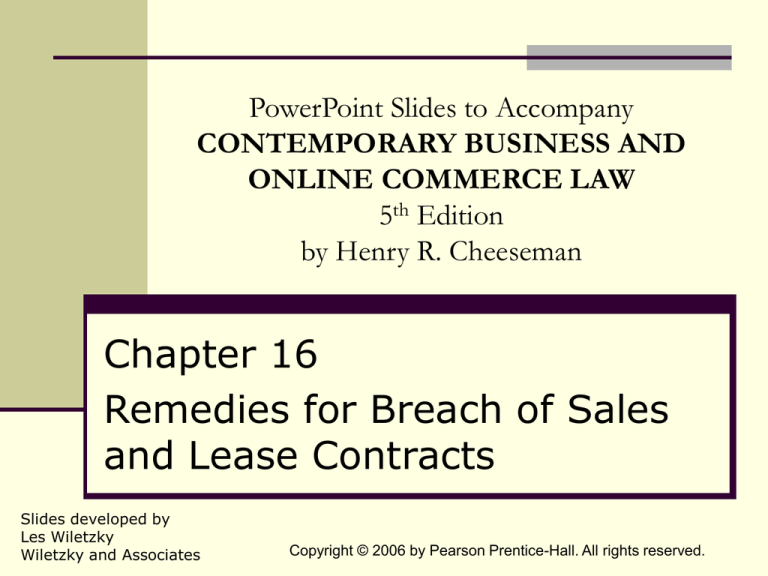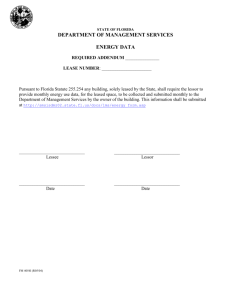
PowerPoint Slides to Accompany
CONTEMPORARY BUSINESS AND
ONLINE COMMERCE LAW
5th Edition
by Henry R. Cheeseman
Chapter 16
Remedies for Breach of Sales
and Lease Contracts
Slides developed by
Les Wiletzky
Wiletzky and Associates
Copyright © 2006 by Pearson Prentice-Hall. All rights reserved.
Introduction
Obligation – An action a party to a sales
or lease contract is required by law to
carry out
Breach – Failure of a party to perform an
obligation in a sales or lease contract
When one party breaches the lease or
sales contract, the UCC provides the
injured party with a variety of pre-litigation
and litigation remedies
Copyright © 2006 by Pearson Prentice-Hall. All rights reserved.
16 - 2
Seller’s and Lessor’s Performance:
Tender of Delivery
The obligation of the seller to transfer and deliver
goods to the buyer or lessee in accordance with
the sales or lease contract
Requires the seller or lessor to:
1. put and hold conforming goods at the buyer’s or
lessee's disposition; and
2. give the buyer or lessee any notification reasonably
necessary to enable the buyer or lessee to take
delivery of the goods [UCC 2-503(1), 2A-508(1)]
Copyright © 2006 by Pearson Prentice-Hall. All rights reserved.
16 - 3
Seller’s and Lessor’s Performance:
Place of Delivery (1 of 2)
Many sales and lease contracts state
where the goods are to be delivered
If the contract does not expressly state
where the delivery will take place, the
UCC will stipulate place of delivery on the
basis of whether a carrier is involved
[UCC 2-504, 2-503]
Copyright © 2006 by Pearson Prentice-Hall. All rights reserved.
16 - 4
Seller’s and Lessor’s Performance:
Place of Delivery (2 of 2)
Bailee – a holder of goods who is not a seller or
buyer
e.g., a warehouse
Shipment Contract – a sales contract that
requires the seller to send the goods to the
buyer, but not a specifically named destination
Destination Contract – a sales contract that
requires the seller to deliver the goods to the
buyer’s place of business or another specified
destination
Copyright © 2006 by Pearson Prentice-Hall. All rights reserved.
16 - 5
Seller’s and Lessor’s Performance:
Perfect Tender Rule (1 of 2)
The seller or lessor is under a duty to
deliver conforming goods
If the goods or tender of delivery fails in
any respect to conform to the contract, the
buyer or lessee may opt either to:
Reject the whole shipment;
Accept the whole shipment; or
Reject part and accept part of the shipment
Copyright © 2006 by Pearson Prentice-Hall. All rights reserved.
16 - 6
Seller’s and Lessor’s Performance:
Perfect Tender Rule (2 of 2)
Exceptions to the perfect tender rule:
Agreement of the parties
Substitution of carriers
Cure
Installment contracts
Destruction of goods
Copyright © 2006 by Pearson Prentice-Hall. All rights reserved.
16 - 7
Seller’s and Lessor’s Performance:
General Obligations
The UCC has adopted
several broad principles
that govern the
performance of sales and
lease contracts:
Copyright © 2006 by Pearson Prentice-Hall. All rights reserved.
Good Faith
Reasonableness
Commercial
Reasonableness
16 - 8
Buyer’s and Lessee’s Performance:
Right of Inspection
Unless otherwise agreed, the buyer or
lessee has the right to inspect goods that are
tendered, delivered, or identified to the sales
contract prior to accepting or paying for them
[UCC 2-513(1), 2A-515(1)]
If the goods conform to the contract, the
buyer pays for the inspection
Buyers who agree to C.O.D. (cash on
delivery) deliveries are not entitled to inspect
the goods before paying for them [UCC 2513(3)]
Copyright © 2006 by Pearson Prentice-Hall. All rights reserved.
16 - 9
Buyer’s and Lessee’s Performance:
Payment
Duty to Pay – goods that are accepted
must be paid for
Unless the parties agree otherwise,
payment is due from a buyer when and
where the goods are delivered even if the
place of delivery is the same as the place
of shipment [UCC 2-310, 2A-516(1)]
Copyright © 2006 by Pearson Prentice-Hall. All rights reserved.
16 - 10
Buyer’s and Lessee’s Performance:
Acceptance
Occurs when the buyer or lessee takes any
of the following actions after a reasonable
opportunity to inspect the goods [UCC 2606, 2A-515]:
Signifies to the seller or lessor in words or by conduct
that the goods are conforming or that the buyer or
lessee will take or retain the goods despite their
nonconformity, or
Fails to effectively reject the goods within a reasonable
time after their delivery or tender by the seller or lessor
Copyright © 2006 by Pearson Prentice-Hall. All rights reserved.
16 - 11
Buyer’s and Lessee’s Performance:
Revocation of Acceptance (1 of 2)
A buyer or lessee who has accepted
goods may subsequently revoke
acceptance if:
1. The goods are nonconforming;
2. The nonconformity substantially impairs the
value of the goods to the buyer or lessee;
and
Copyright © 2006 by Pearson Prentice-Hall. All rights reserved.
16 - 12
Buyer’s and Lessee’s Performance:
Revocation of Acceptance (2 of 2)
3. One of the following factors is shown:
a) The seller’s or lessor’s promise to seasonably
remedy the nonconformity is not met;
b) The goods were accepted before the
nonconformity was discovered and the
nonconformity was difficult to discover; or
c) The goods were accepted before the
nonconformity was discovered and the seller or
lessor assured the the buyer or lessee that the
goods were conforming
Copyright © 2006 by Pearson Prentice-Hall. All rights reserved.
16 - 13
Seller’s and Lessor’s Remedies:
Right to Withhold Delivery
Delivery of the goods may be withheld if
the seller or lessor is in possession of
them when the buyer or lessee breaches
the contract
This remedy is available if the buyer or
lessee:
Wrongfully rejects or revokes acceptance of the goods;
Fails to make payment when due; or
Repudiates the contract
Copyright © 2006 by Pearson Prentice-Hall. All rights reserved.
16 - 14
Seller’s and Lessor’s Remedies: Right to
Stop Delivery of Goods in Transit (1 of 2)
In Transit – a state in which goods are in
the possession of a bailee or carrier and
not in the hands of the buyer, seller,
lessee, or lessor
A seller or lessor may stop delivery of
goods in transit if he or she learns of the
buyer’s or lessee’s insolvency
Copyright © 2006 by Pearson Prentice-Hall. All rights reserved.
16 - 15
Seller’s and Lessor’s Remedies: Right to
Stop Delivery of Goods in Transit (2 of 2)
The same remedy is available if the buyer
or lessee:
Repudiates the contract,
Fails to make payment when due, or
Otherwise gives the seller or lessor some
other right to withhold or reclaim the goods
Copyright © 2006 by Pearson Prentice-Hall. All rights reserved.
16 - 16
Seller’s and Lessor’s Remedies:
Right to Reclaim Goods
The right of a seller or lessor to demand
the return of goods from the buyer or
lessee under specified situations
To exercise the right of reclamation, the
seller or lessor must send the buyer or
lessee a written notice demanding return
of the goods
Copyright © 2006 by Pearson Prentice-Hall. All rights reserved.
16 - 17
Seller’s and Lessor’s Remedies:
Right to Dispose of Goods
If the buyer or lessee breaches or
repudiates the seller or lease contract
before the seller or lessor has delivered
the goods, the seller or lessor may resell
or release the goods and recover
damages from the buyer or lessee
This right also arises if the seller or lessor
has reacquired the goods after stopping
them in transit
Copyright © 2006 by Pearson Prentice-Hall. All rights reserved.
16 - 18
Seller’s and Lessor’s Remedies: Right
to Recover the Purchase Price or Rent
A seller or lessor may recover the
contracted-for purchase price or rent from
the buyer or lessee if:
The buyer or lessee accepts the goods but fails to pay
for them when the price or rent is due
The buyer or lessee breaches the contract after the
goods have been identified to the contract and the
seller or lessor cannot resell or dispose of them
The goods are damaged or lost after the risk of loss
passes to the buyer or lessee
Copyright © 2006 by Pearson Prentice-Hall. All rights reserved.
16 - 19
Seller’s and Lessor’s Remedies:
Recovery of Damages
A seller or lessor may recover damages
measured as the difference between the
contract price (or rent) and the market
price (or rent) at the time and place the
goods were to be delivered, plus
incidental damages, from a buyer or
lessee who repudiates the contract or
wrongfully rejects tendered goods
Copyright © 2006 by Pearson Prentice-Hall. All rights reserved.
16 - 20
Seller’s and Lessor’s Remedies:
Recovery of Lost Profits
The seller or lessor may recover lost
profits, plus an allowance of overhead and
incidental damages, from the buyer or
lessee if the recovery of damages would
be inadequate to put the seller or lessor in
as good a position as if the contract had
been fully performed by the buyer or
lessee
Copyright © 2006 by Pearson Prentice-Hall. All rights reserved.
16 - 21
Seller’s and Lessor’s Remedies:
Right to Cancel the Contract
A seller or lessor may cancel a sales or
lease contract if the buyer or lessee:
Rejects or revokes acceptance of the goods;
Fails to pay for the goods; or
Repudiates the contract in part or in whole
Copyright © 2006 by Pearson Prentice-Hall. All rights reserved.
16 - 22
Summary: Seller’s and Lessor’s
Remedies (1 of 2)
Possession of Goods at Seller’s or Lessor’s Remedies
Time of Buyer’s Breach
Goods in the possession
of the seller
Withhold delivery of the goods.
Demand payment in cash if the buyer is
insolvent.
Resell or re-lease the goods and recover the
difference between the contract or lease price
and the resale or re-lease price.
Sue for breach of contract and recover
damages.
Cancel the contract.
Copyright © 2006 by Pearson Prentice-Hall. All rights reserved.
16 - 23
Summary: Seller’s and Lessor’s
Remedies (2 of 2)
Possession of Goods at Seller’s or Lessor’s Remedies
Time of Buyer’s Breach
Goods in the possession
of a carrier or bailee
Stop goods in transit:
Goods in the possession
of the buyer
Carload, truckload, planeload, or larger shipment if
the buyer is solvent.
Any size shipment if the buyer is insolvent.
Sue to recover the purchase price or rent.
Reclaim the goods.
Copyright © 2006 by Pearson Prentice-Hall. All rights reserved.
16 - 24
Buyer’s and Lessee’s Remedies
(1 of 2)
Right to reject nonconforming goods or
improperly tendered goods
Right to recover goods from an insolvent
seller or lessor
Right to obtain specific performance
Right to cover
Right to replevy goods
Copyright © 2006 by Pearson Prentice-Hall. All rights reserved.
16 - 25
Buyer’s and Lessee’s Remedies
(2 of 2)
Right to cancel the contract
Right to recover damages for non-delivery
or repudiation
Right to recover damages for accepted
nonconforming goods
Copyright © 2006 by Pearson Prentice-Hall. All rights reserved.
16 - 26
Summary: Buyer’s and Lessee’s
Remedies (1 of 2)
Situation
Buyer’s or Lessee’s Remedy
Seller or lessor refuses to
deliver the goods or
delivers the nonconforming
goods that the buyer or
lessee does not want.
Reject nonconforming goods
Revoke acceptance of nonconforming
goods
Cover
Sue for breach of contract and recover
damages
Cancel the contract
Copyright © 2006 by Pearson Prentice-Hall. All rights reserved.
16 - 27
Summary: Buyer’s and Lessee’s
Remedies (2 of 2)
Situation
Buyer’s or Lessee’s Remedy
Seller or lessor tenders
nonconforming goods and
the buyer or lessee accepts
them.
Sue for ordinary damages
Deduct damages from the unpaid purchase
price
Seller or lessor refuses to
deliver the goods and the
buyer or lessee wants them
Sue for specific performance
Replevy the goods
Recover the goods from an insolvent seller
or lessor
Copyright © 2006 by Pearson Prentice-Hall. All rights reserved.
16 - 28
Additional Issues Affecting
Performance and Breach
1. Assurance of
Performance
2. Anticipatory
Repudiation
3. Statute of
Limitations
4. Agreements
Affecting Remedies
Copyright © 2006 by Pearson Prentice-Hall. All rights reserved.
16 - 29
Unconscionable Contract
The UCC Article 2 (Sales) and Article 2A (Leases)
have adopted the equity doctrine of unconscionability
To prove unconscionability, there must be proof:
that the parties had substantial unequal bargaining
power;
that the dominant party misused its power in
contracting; and
that it would be manifestly unfair or oppressive to
enforce the contract
This doctrine also applies to Web contracts
Copyright © 2006 by Pearson Prentice-Hall. All rights reserved.
16 - 30








